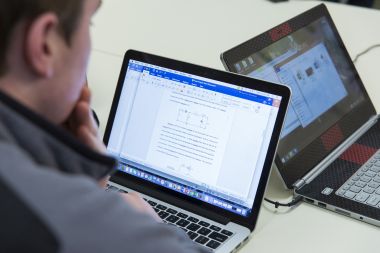Think Before You Link
Protect Your Computer From the Latest Ransomware
 |
|
Routinely turning off your computer forces a reboot when you power back on, which will keep your device updated with new software and security patches. (Photo by Paul Miller) |
ALBANY, N.Y. (May 16, 2017) — Over the weekend, a massive cyberattack had institutions and individuals in 100 countries reeling. The malicious software, stolen from the National Security Agency and spread via email, encrypts data, locks users out and demands a payment to allow access.
Thought to be the largest ransomware assault to date, the attack hit Russia, India, Europe, Africa, Latin America and the United States. British hospitals were locked out of computer systems and the patient records held there. Telecom companies in Spain and Russia were infected.
The good news? No infections have been found at UAlbany – or at any SUNY school – so far, said Martin Manjak, UAlbany’s chief information security officer.
And the easiest way to keep your own computer protected? Keep your operating systems and applications up-to-date and don’t click on email attachments or links if you are not 100 percent sure of the source.
This form of ransomware, called WannaCry, affects Windows workstations. All University computers receive monthly updates and patches. As long as you routinely turn your computer off, turning it back on will automatically update Windows with the latest programs and security patches.
But not everyone on campus regularly power cycles their machine. On Monday morning, more than 500 campus workstations did not have the latest software patches installed, Manjak said. A forced re-boot of these machines is planned to address this gap.
Once WannaCry infects one computer, it actively seeks other unpatched systems on the network and encrypts them, Manjak said. “That’s why it’s so devastating for organizations that remain unpatched.”
The University distributes patches and updates every second Tuesday of the month, and University computers should be turned off and rebooted at least once monthly to complete the installation of the updates. But more often is better, said Manjak, who turns his own office computer off every day.
“First of all it’s the right thing to do from a sustainability perspective,” he said. Keeping your computer off when it’s not in use also helps protect the entire system from attempts by hackers to infiltrate institutions. “We’re constantly being poked at by potential intruders looking for vulnerabilities,” he said.
For personal devices, keep your operating system up-to-date. Microsoft has a list of security updates for versions of Windows. The University’s Information Technology Services issued a memo Monday urging faculty and staff to use the list to ensure all personal and home machines are up to date. Because of WannaCry, the site may be extra busy for the next few days.
Be wary of email, and think twice before clicking on any attachment. “Standard practice is, anything that looks strange, probably is,” Manjak said.
![]() For more news, subscribe to UAlbany's RSS headline feeds
For more news, subscribe to UAlbany's RSS headline feeds
A comprehensive public research university, the University at Albany-SUNY offers more than 120 undergraduate majors and minors and 125 master's, doctoral and graduate certificate programs. UAlbany is a leader among all New York State colleges and universities in such diverse fields as atmospheric and environmental sciences, business, education, public health,health sciences, criminal justice, emergency preparedness, engineering and applied sciences, informatics, public administration, social welfare and sociology, taught by an extensive roster of faculty experts. It also offers expanded academic and research opportunities for students through an affiliation with Albany Law School. With a curriculum enhanced by 600 study-abroad opportunities, UAlbany launches great careers.


